The journey to better health can often be a balancing act. For many, reducing carbs can improve energy, aid weight management, and stabilize blood sugar. At the same time, the benefits of a vegetarian diet—better heart health, reduced risk of chronic diseases, and environmental impact—are widely recognized. Merging these two approaches into a low-carb vegetarian meal plan can be challenging, but it offers unique health benefits.
Whether you’re a vegetarian seeking to reduce carbs or exploring new dietary options, this guide walks you through each essential step, including sample meal ideas, nutrient tips, and recipes for a successful low carb vegetarian lifestyle.
Understanding Low Carb Diet Basics
What is a Low Carb Diet?
A low carb diet reduces or restricts carbohydrate intake. Popular low-carb approaches include the keto diet, Atkins, and other modified low-carb plans, each with varying carb limits and food guidelines.
- Carbohydrate Levels: Low-carb diets generally range from mild restriction (around 100 grams per day) to strict levels (20–30 grams daily).
- Primary Foods: Emphasizes proteins, healthy fats, and low-starch vegetables, minimizing high-carb foods like bread, pasta, and sugary snacks.
Why Choose a Low Carb Diet?
People often select a low-carb diet for reasons like:
- Weight Loss: Restricting carbs helps the body burn stored fat for energy.
- Blood Sugar Management: Fewer carbs can lead to stable blood sugar and insulin levels.
- Improved Metabolism: A diet low in carbs may benefit metabolic health and reduce risk factors for heart disease.
Vegetarianism and Its Variants
In recent years, vegetarianism has gained popularity as people seek diets that are both health-conscious and environmentally friendly. But vegetarianism isn’t a one-size-fits-all approach. While the central principle of vegetarian diets is to avoid meat, there are several variants of vegetarianism, each with its own unique characteristics and dietary allowances. Understanding these variants can help in crafting a well-rounded low carb vegetarian meal plan tailored to individual needs and preferences.
Overview of Vegetarianism
At its core, vegetarianism is a diet that excludes meat, poultry, and fish. It revolves around a plant-based eating style, emphasizing fruits, vegetables, grains, nuts, and seeds. However, vegetarianism allows for flexibility, and different variations permit or exclude certain animal products. Each type of vegetarianism offers diverse nutritional profiles, which can influence how easily a low carb approach is adopted within each dietary framework.
The Different Types of Vegetarian Diets
Vegetarian diets vary based on which animal products, if any, are included. Here are the most common types:
- Lacto-Vegetarian: This diet includes dairy products like milk, cheese, and yogurt but excludes eggs, meat, poultry, and fish. Lacto-vegetarians rely heavily on dairy as a protein source, which can complement a low carb plan due to the high-fat and protein content in products like cheese and Greek yogurt.
- Ovo-Vegetarian: Unlike lacto-vegetarians, ovo-vegetarians include eggs in their diet but avoid dairy products. Eggs are an excellent source of protein and healthy fats, making them a valuable component of a low carb vegetarian meal plan.
- Lacto-Ovo Vegetarian: This is one of the most common vegetarian diets, allowing both eggs and dairy. It offers more protein options for low carb diets, as both eggs and dairy products contain protein without significant carbs.
- Vegan: Vegans exclude all animal products, including dairy, eggs, and honey. This diet is strictly plant-based and often the most challenging for a low carb diet, as it requires careful planning to ensure adequate protein and fat intake without high-carb plant foods.
Protein Sources in Different Types of Vegetarian Diets
Each type of vegetarian diet provides distinct protein options. Protein is essential for muscle maintenance, energy, and satiety, especially on a low carb diet, where traditional high-carb foods are limited. Here’s a breakdown of common protein sources across different vegetarian variants:
- For Lacto-Vegetarians: Dairy products like Greek yogurt, cheese, and cottage cheese are high in protein and often low in carbs, depending on the product.
- For Ovo-Vegetarians: Eggs are a versatile, zero-carb protein source and can be used in everything from breakfast scrambles to low carb desserts.
- For Lacto-Ovo Vegetarians: Both eggs and dairy provide protein flexibility. Lacto-ovo vegetarians can incorporate tofu, tempeh, and dairy products into a low carb plan.
- For Vegans: Protein comes from plant-based sources like tofu, tempeh, and certain nuts and seeds. Vegan options require attention to macronutrient ratios, as many plant proteins are also sources of carbs.
Nutrient Considerations for Each Variant
Vegetarian diets are packed with nutrients, but each variant has different nutritional focuses and considerations to ensure balanced intake. A low carb vegetarian meal plan must address these needs carefully, as reducing carbs can mean missing out on nutrients typically found in high-carb vegetables, grains, and legumes.
- Iron: Plant-based iron sources, like dark leafy greens, beans, and fortified cereals, are crucial for all vegetarians. Iron absorption is enhanced by pairing with vitamin C-rich foods (like bell peppers and citrus).
- Vitamin B12: This essential nutrient is naturally found only in animal products, so vegans and some vegetarians may need to supplement or consume fortified foods.
- Calcium: Especially important for vegans and ovo-vegetarians, as dairy is a primary calcium source. Calcium-fortified plant milks, broccoli, and almonds can help fill this gap.
- Omega-3 Fatty Acids: Found in high quantities in fish, vegetarians should consider plant-based sources like chia seeds, flaxseeds, and walnuts to meet omega-3 needs. Vegans may also look into algal oil supplements.
- Protein Needs: With reduced carbohydrate intake, protein becomes an essential part of a low carb vegetarian diet. While most vegetarians can easily reach protein goals with a variety of foods, vegans may find it challenging due to the carb content in beans and legumes. Low carb-friendly options like tofu, tempeh, and nuts are ideal for vegan diets.
Common Myths and Misconceptions about Vegetarianism
There are many misconceptions about vegetarianism, especially when paired with a low carb diet. Here are a few myths and the realities:
- Myth 1: Vegetarians Can’t Get Enough Protein
Reality: A well-planned vegetarian diet can meet all protein needs. Options like eggs, dairy, tofu, and tempeh are rich in protein without excessive carbs. - Myth 2: All Vegetarian Diets Are High in Carbs
Reality: While plant-based diets often emphasize grains and legumes, low carb adjustments can be made by focusing on non-starchy vegetables, nuts, seeds, and high-protein options like cheese and eggs. - Myth 3: Vegetarianism Lacks Nutrients
Reality: With careful planning, vegetarians can achieve a balanced diet with adequate vitamins, minerals, and protein. Supplements can help with nutrients like B12 and omega-3s for those who need them.
Benefits of a Low Carb Vegetarian Meal Plan
Combining a low carb approach with vegetarianism offers unique benefits, including: (1)
- Weight Management: Eating fewer carbs, particularly refined carbs, aids in weight control.
- Improved Blood Sugar Control: Low carb diets can benefit blood glucose stability, which is crucial for metabolic health.
- Enhanced Energy: Focusing on high-protein, low-carb meals can help avoid energy dips.
Key Nutrients in a Low Carb Vegetarian Diet
A successful low carb vegetarian diet requires careful planning to ensure you’re meeting essential nutrient needs. While limiting carbs, focusing on a balance of high-quality proteins, healthy fats, and essential vitamins and minerals that support energy, muscle health, and overall wellness is crucial. Let’s break down the key nutrients you should prioritize on a low carb vegetarian diet and how to get enough of each.
Protein
Protein is essential on a low carb vegetarian meal plan to support muscle health, energy levels, and satiety. Because vegetarians don’t consume meat, it’s important to include plant-based protein sources that fit within a low-carb framework. (2)
- Top Low Carb Vegetarian Protein Sources:
- Tofu and Tempeh: Excellent plant-based proteins derived from soy. Both are low in carbs, versatile, and can be prepared in a variety of dishes.
- Greek Yogurt: Contains around 15 grams of protein per serving, along with probiotics for gut health. Opt for plain, unsweetened varieties to avoid added sugars.
- Cottage Cheese: With high protein and low carb content, it’s perfect for breakfast or as a snack.
- Eggs: Ideal for lacto-ovo vegetarians, eggs are nutrient-dense, zero-carb, and contain all essential amino acids.
- Nuts and Seeds: Almonds, chia seeds, and hemp seeds provide protein along with healthy fats, though they should be eaten in moderation due to their calorie density.
- Daily Protein Goal: Aim for at least 1.0–1.2 grams of protein per kilogram of body weight, or approximately 15-20% of your total calorie intake. For example, a 150-pound person would need around 68-82 grams of protein daily.
Healthy Fats
Since a low carb diet reduces energy from carbohydrates, healthy fats become a primary energy source. Fats not only support cellular health but also help keep you full and energized throughout the day. (3)
- Key Fat Sources for Vegetarians:
- Avocado: Packed with monounsaturated fats and fiber, avocado is a nutritious option for salads and snacks.
- Olive Oil: High in antioxidants and healthy fats, it’s ideal for cooking or drizzling over vegetables.
- Coconut Oil: Contains medium-chain triglycerides (MCTs), which are easily metabolized and provide a quick energy source.
- Nuts and Seeds: Almonds, walnuts, flaxseeds, and chia seeds offer a combination of protein, fiber, and omega-3 fatty acids.
- Full-Fat Dairy: For those who include dairy, options like whole-milk Greek yogurt, cheese, and cream are high in fat and low in carbs.
- Daily Fat Goal: Healthy fats should make up around 50–70% of your daily calories on a low carb diet. For example, if your target intake is 1,500 calories, aim for approximately 83–117 grams of fat per day.
Fiber
A challenge with low carb diets is maintaining adequate fiber intake, as many high-fiber foods also contain carbs. Fiber is crucial for digestive health, blood sugar balance, and heart health, and helps you feel full on a low-carb meal plan.
- Low Carb Fiber-Rich Foods:
- Leafy Greens: Spinach, kale, and arugula are low in carbs but high in fiber and vitamins.
- Broccoli and Cauliflower: Both are versatile, fiber-packed vegetables perfect for low-carb recipes.
- Chia Seeds and Flaxseeds: These add fiber to smoothies and yogurts and can help with satiety.
- Zucchini and Bell Peppers: Both contain fiber and add bulk to meals with very few carbs.
- Daily Fiber Goal: Aim for around 25–30 grams of fiber daily. Adding chia seeds to a yogurt bowl or incorporating leafy greens in salads can help you reach your fiber goals while keeping carbs low.
Vitamins and Minerals
Certain nutrients are harder to get on a vegetarian diet, and with added carb restrictions, it’s essential to plan for these vitamins and minerals to maintain a balanced, nutrient-rich diet.
- Iron: Necessary for energy production and oxygen transport. Non-heme iron, found in plant-based foods, is less readily absorbed than heme iron from animal sources.
- Sources: Dark leafy greens (like spinach), lentils (in small amounts if carbs allow), tofu, and pumpkin seeds.
- Tip: Pair iron-rich foods with vitamin C sources (like bell peppers) to improve absorption.
- Vitamin B12: Important for nerve function and energy, vitamin B12 is mostly found in animal products.
- Sources: Fortified plant milk and cereals, eggs, and dairy products. Vegans may need a B12 supplement.
- Calcium: Critical for bone health, muscle contraction, and nerve signaling.
- Sources: Dairy products (if included), fortified plant milk, leafy greens, and almonds.
- Tip: Check the labels of plant milk to ensure they are fortified with calcium.
- Omega-3 Fatty Acids: Beneficial for heart and brain health, omega-3s are mostly found in fatty fish, but vegetarians can rely on plant-based sources.
- Sources: Flaxseeds, chia seeds, walnuts, and algae oil (for a direct source of DHA and EPA).
- Tip: Consider a daily algae-based omega-3 supplement for better bioavailability.
Electrolytes
When following a low carb diet, electrolyte imbalances can occur, especially if carb intake is reduced quickly. Electrolytes such as sodium, potassium, and magnesium play a role in muscle function, nerve health, and hydration.
- Electrolyte Sources:
- Sodium: A pinch of salt on meals or sipping vegetable broth can help meet sodium needs.
- Potassium: Found in foods like spinach, avocados, and mushrooms.
- Magnesium: Crucial for muscle function and stress regulation. Almonds, pumpkin seeds, and leafy greens are good sources.
- Daily Electrolyte Goal: Potassium and magnesium needs vary by individual, but most adults need around 4,700 mg of potassium and 310–420 mg of magnesium daily.
Antioxidants and Phytonutrients
A low carb vegetarian diet rich in antioxidants and phytonutrients can help reduce inflammation and protect against chronic diseases.
- Top Antioxidant Foods:
- Berries: Although they contain natural sugars, moderate amounts of strawberries, blackberries, and raspberries can fit into a low carb plan and are loaded with antioxidants.
- Dark Leafy Greens: Kale, spinach, and Swiss chard are packed with vitamins A, C, and K.
- Herbs and Spices: Turmeric, ginger, and cinnamon not only add flavor but also contain anti-inflammatory properties.
- Daily Goal: Include a variety of colorful vegetables, herbs, and spices in meals to ensure a wide range of antioxidants and phytonutrients.
Carbohydrate Control in a Vegetarian Diet
Managing carbohydrate intake on a vegetarian diet requires careful planning, especially if you’re aiming for a low carb vegetarian meal plan. Carbohydrates are abundant in plant-based foods, from starchy vegetables to whole grains, beans, and legumes. However, by selecting the right types and portions of carbs, you can maintain a balanced, low carb vegetarian diet that supports your health goals. Here’s a breakdown of how to manage carbohydrate intake effectively while still meeting your nutritional needs as a vegetarian.
High-Carb vs. Low-Carb Vegetables
Vegetables are a cornerstone of any vegetarian diet, but they vary widely in carbohydrate content. Understanding which vegetables are low in carbs and which are high can help you make informed choices.
- Low-Carb Vegetables: Non-starchy vegetables like spinach, kale, cucumbers, and bell peppers are nutrient-dense yet low in carbohydrates, making them ideal for a low carb meal plan.
- Examples: Leafy greens (spinach, kale), cruciferous vegetables (broccoli, cauliflower), and salad greens (lettuce, arugula).
- Carb Content: Typically under 5 grams of net carbs per serving.
- High-Carb Vegetables: Starchy vegetables, like potatoes, sweet potatoes, corn, and peas, contain significantly more carbs and are best limited on a low carb diet.
- Examples: Potatoes, sweet potatoes, corn, and beets.
- Carb Content: 15-30 grams of carbs per serving, depending on the vegetable.
- Tips for Including Vegetables in a Low Carb Vegetarian Diet:
- Focus on non-starchy vegetables for bulk and fiber without adding too many carbs.
- Use high-carb vegetables sparingly or as occasional treats if they fit within your daily carb limits.
Choosing the Right Plant-Based Carbohydrates
When adopting a low carb approach, it’s still important to include certain plant-based carbs for energy, fiber, and essential nutrients. The goal is to prioritize complex, fiber-rich carbohydrates that digest slowly, keeping blood sugar levels stable and promoting satiety.
- Best Choices for Low Carb, High-Fiber Carbs:
- Berries: Strawberries, raspberries, and blackberries are low in carbs and high in fiber, making them a great choice for a low carb diet.
- Zucchini: Often used as a substitute for pasta or rice, zucchini is low in carbs and versatile in recipes.
- Mushrooms: Low in carbs and high in umami flavor, mushrooms work well in a variety of dishes.
- Eggplant: Another low-carb vegetable, eggplant can add bulk and texture to meals.
- Moderate Carbs with High Fiber: Foods like chickpeas, black beans, and lentils are higher in carbs, but their fiber content helps slow digestion. For a low carb plan, you may want to consume them in smaller portions.
- Example Serving: A small serving of chickpeas (¼ cup) provides around 8-10 grams of carbs, of which 2-3 grams are fiber.
How to Balance Carbs Without Sacrificing Fiber
One of the challenges of reducing carbs is potentially missing out on fiber, which is crucial for digestive health, blood sugar regulation, and fullness. Here’s how to strike the right balance:
- Prioritize Fiber-Rich Vegetables: Non-starchy vegetables like leafy greens, broccoli, and cauliflower offer fiber without adding too many carbs.
- Add Low-Carb, High-Fiber Seeds: Chia seeds and flaxseeds are packed with fiber and healthy fats, adding bulk to smoothies or yogurts without a significant carb load.
- Incorporate Small Amounts of Beans or Lentils: If your carb allowance permits, small portions of beans or lentils can help you meet your fiber needs.
Low Glycemic Index (GI) Options for Vegetarians
The Glycemic Index (GI) measures how quickly a food raises blood sugar. Low-GI foods digest more slowly, leading to steadier blood sugar levels—a crucial factor for maintaining energy on a low carb diet.
- Why Low-GI Foods Are Important: Eating low-GI foods helps keep insulin levels stable, reduces cravings, and promotes steady energy levels.
- Low-GI, Low-Carb Foods for Vegetarians:
- Leafy Greens: Spinach, Swiss chard, and arugula are all low in carbs and have minimal impact on blood sugar.
- Non-Starchy Vegetables: Broccoli, bell peppers, and zucchini are not only low in carbs but also low on the glycemic index.
- Nuts and Seeds: Almonds, walnuts, chia seeds, and flaxseeds are high in fiber and healthy fats, keeping their GI low.
For a vegetarian, choosing low-GI, low-carb foods can help with both blood sugar control and long-lasting satiety.
Foods to Avoid for Low Carb Success
While a low carb vegetarian diet still allows a variety of nutrient-dense foods, certain high-carb vegetarian foods are best avoided or limited.
- Grains and Refined Carbs:
- White Bread and Pasta: These are high in simple carbs, which can lead to quick spikes in blood sugar.
- Rice: Even whole-grain rice is carb-heavy, with about 45 grams of carbs per cup cooked.
- Corn and Corn Products: Corn, cornmeal, and products made from corn (like tortillas) contain high levels of carbs and sugar.
- Sugary Snacks and Desserts:
- Sugary Yogurts: Flavored yogurts often contain added sugars, which can quickly increase carb intake.
- Fruit Juices: Although natural, fruit juices are high in sugar and lack the fiber found in whole fruit, making them unsuitable for low carb diets.
- Dried Fruits: Raisins, dried apricots, and other dried fruits are concentrated sources of natural sugars and carbs.
- Starchy Vegetables:
- Potatoes and Sweet Potatoes: Both are high in carbs, with sweet potatoes also ranking high on the glycemic index.
- Beets: While nutrient-dense, beets are relatively high in sugar and should be limited.
Practical Tips for Carbohydrate Control in a Vegetarian Diet
Maintaining a low carb intake as a vegetarian requires careful food selection and portion control. Here are some tips to keep your carb count low while enjoying a balanced and satisfying diet:
- Build Your Meals Around Protein and Low-Carb Vegetables: Make non-starchy vegetables like zucchini, cauliflower, and leafy greens the base of your meals, adding protein sources like tofu, eggs, or cheese to increase satiety.
- Use Cauliflower as a Carb Replacement: Cauliflower can be used to create rice, mash, or even a low-carb pizza crust, offering a versatile alternative to higher-carb foods.
- Limit Portions of Higher-Carb Vegetables and Grains: If you do choose to include foods like quinoa, lentils, or beans, keep portions small to stay within your carb limit.
- Snack Wisely: Choose low-carb snacks like nuts, cheese, cucumber slices, or small portions of berries to avoid high-carb snacks that can increase your daily carb count.
- Track Your Carb Intake: Using a tracking app or food diary can help you stay aware of hidden carbs and ensure you’re hitting your nutritional goals without going over your carb limit.
By understanding and controlling your carbohydrate intake, you can create a low carb vegetarian meal plan that aligns with your health goals, supports steady energy levels, and helps with weight management. Careful food choices, portion control, and selecting low-GI, fiber-rich foods make it possible to thrive on a low carb vegetarian diet while enjoying a variety of delicious, plant-based meals.
Low Carb Vegetarian Protein Sources
Finding sufficient, high-quality protein sources is essential in a low carb vegetarian diet, as protein plays a crucial role in muscle maintenance, energy, and overall health. However, since traditional sources of protein like meat and fish are excluded, vegetarians need to focus on low carb, high-protein plant-based foods. With a variety of plant-based options, as well as dairy and eggs for lacto-ovo vegetarians, you can easily meet your protein needs without overloading with carbs. Here’s a deep dive into the best low carb vegetarian protein sources and tips for incorporating them into your meals.
1. Tofu and Tempeh
Both tofu and tempeh are excellent low carb vegetarian protein sources derived from soybeans. These foods are not only high in protein but also incredibly versatile, easily absorbing flavors from sauces, spices, and marinades.
- Tofu: Also known as bean curd, tofu is made by pressing soy milk into blocks. It’s mild in flavor, making it ideal for a variety of dishes from scrambles to stir-fries.
- Protein Content: Around 10 grams of protein per 100-gram serving.
- Carb Content: Approximately 2 grams of carbs per serving.
- Tempeh: Tempeh is made from fermented soybeans, giving it a firmer texture and a slightly nutty flavor. The fermentation process also provides beneficial probiotics for gut health.
- Protein Content: Approximately 15 grams of protein per 100-gram serving.
- Carb Content: About 4 grams of carbs per serving.
- How to Use: Tofu can be baked, stir-fried, or blended into smoothies, while tempeh is ideal for grilling, pan-frying, or adding to salads and wraps. Both are excellent additions to a low carb vegetarian diet as they are filling, protein-rich, and low in carbs.
2. Eggs
Eggs are a complete protein source, containing all nine essential amino acids. For vegetarians who include eggs in their diet, they provide a highly nutritious, zero-carb option that’s easy to incorporate into any meal.
- Protein Content: Approximately 6 grams of protein per large egg.
- Carb Content: 0 grams of carbs per egg.
- Health Benefits: Eggs are rich in vitamin B12, choline, and omega-3 fatty acids (in certain types of eggs). They are also highly satiating, making them an ideal breakfast option for low carb vegetarians.
- How to Use: Eggs can be scrambled, boiled, poached, or used in low carb baking. Add boiled eggs to salads or enjoy them as a protein-rich snack.
3. Greek Yogurt
Greek yogurt, especially unsweetened and full-fat varieties, is a protein powerhouse with a low carb count, making it an excellent choice for vegetarians who include dairy in their diet.
- Protein Content: About 10–15 grams of protein per 100-gram serving.
- Carb Content: Approximately 3–4 grams of carbs per serving (unsweetened).
- Health Benefits: Greek yogurt is rich in calcium, probiotics, and vitamin B12, supporting bone health and gut health.
- How to Use: Use Greek yogurt as a base for smoothies, as a topping for berries, or as a substitute for sour cream in recipes. For a simple snack, mix in chia seeds or nuts for added protein and crunch.
4. Cottage Cheese
Cottage cheese is another low carb, high-protein dairy option for lacto-vegetarians. It’s mild, and creamy, and pairs well with both savory and sweet ingredients.
- Protein Content: Around 11 grams of protein per 100-gram serving.
- Carb Content: Approximately 3–4 grams of carbs per serving.
- Health Benefits: Cottage cheese provides a good source of calcium, phosphorus, and selenium, supporting bone health and immune function.
- How to Use: Cottage cheese can be enjoyed plain, mixed with berries and nuts, or used in savory dishes like salads. You can also blend it into smoothies for an extra protein boost.
5. Nuts and Seeds
Nuts and seeds are convenient, portable sources of protein and healthy fats. While they do contain some carbs, their high fiber content makes them a low net-carb option when eaten in moderation.
- Best Low Carb Nuts and Seeds:
- Almonds: 6 grams of protein and 2 grams of net carbs per 1-ounce serving.
- Chia Seeds: 4 grams of protein and 2 grams of net carbs per tablespoon, plus high levels of fiber.
- Hemp Seeds: 9 grams of protein per 3 tablespoon serving with minimal carbs.
- Flaxseeds: 2 grams of protein and less than 1 gram of net carbs per tablespoon, plus omega-3 fatty acids.
- Health Benefits: Nuts and seeds are rich in fiber, healthy fats, and micronutrients like magnesium and zinc, which are beneficial for energy and immune function.
- How to Use: Add chia seeds or flaxseeds to smoothies, sprinkle hemp seeds on salads, and enjoy almonds as a quick snack. Nuts and seeds can also be used in low carb baking or to add crunch to yogurt and cottage cheese.
6. Cheese
Cheese is an excellent source of protein and fat, and it is naturally low in carbs, making it an ideal option for a low carb vegetarian diet. Different types of cheese offer varying flavors, textures, and nutrient profiles, so you can find options that suit different dishes.
- Protein Content: Varies by type, with around 6–7 grams of protein per ounce for cheeses like cheddar and mozzarella.
- Carb Content: Most cheeses contain less than 1 gram of carbs per ounce.
- Health Benefits: Cheese provides calcium, vitamin A, and conjugated linoleic acid (CLA), which may support fat metabolism.
- How to Use: Use cheese in omelets, salads, or as a topping for low carb veggie dishes. Hard cheeses like Parmesan can also be grated over meals for extra flavor without adding carbs.
7. Low Carb Plant-Based Protein Powders
Protein powders derived from plants, such as pea protein or hemp protein, can be an excellent addition for low carb vegetarians looking to boost their protein intake. Opt for unsweetened varieties to avoid added sugars.
- Protein Content: Around 15–20 grams per scoop, depending on the brand.
- Carb Content: Generally 1–3 grams of carbs per serving in unsweetened versions.
- Health Benefits: Plant-based protein powders are ideal for smoothies, providing a quick and easy way to increase protein without the added carbs.
- How to Use: Blend with unsweetened almond milk, leafy greens, and a handful of berries for a protein-packed, low carb smoothie. You can also add it to Greek yogurt for a high-protein snack.
8. Edamame
Edamame, or young soybeans, is a unique source of protein that is low in carbs when eaten in moderation. It’s also high in fiber, adding bulk to meals without a high carb load.
- Protein Content: Around 8 grams of protein per ½ cup.
- Carb Content: Approximately 7 grams of carbs per ½ cup, but 4 grams are fiber, resulting in about 3 grams of net carbs.
- Health Benefits: Edamame is rich in fiber, iron, and folate, and it provides a satisfying protein boost in small portions.
- How to Use: Edamame can be steamed and added to salads, stir-fries, or eaten on its own with a sprinkle of salt.
9. Seitan
Seitan, also known as wheat gluten, is a high-protein, low-carb meat substitute commonly used in vegan and vegetarian diets. However, it’s unsuitable for those with gluten intolerance.
- Protein Content: About 21 grams of protein per 3-ounce serving.
- Carb Content: Around 4 grams of carbs per serving.
- Health Benefits: Seitan is a great meat alternative that’s dense in protein and has a chewy texture, making it a versatile addition to low carb vegetarian meals.
- How to Use: Use seitan in stir-fries, grilled dishes or as a substitute for meat in sandwiches or wraps.
By focusing on these low carb vegetarian protein sources, you can create a well-rounded, protein-rich diet that meets your nutritional needs, supports muscle maintenance, and keeps you feeling full and energized throughout the day.
Building a Low Carb Vegetarian Meal Plan
Creating a low carb vegetarian meal plan can seem challenging at first. With a few practical guidelines and a clear understanding of your nutritional goals, it’s entirely possible to enjoy satisfying, nutrient-dense meals that keep your carbs low and your energy high. Here’s a step-by-step approach to building a low carb vegetarian meal plan, complete with sample meals, nutrient tips, and meal prep strategies. (4)
Set Clear Goals and Determine Your Carb Limit
Before diving into meal planning, it’s essential to define your carb intake goals. Typically, low carb diets can range from very low (20–50 grams of carbs per day) to moderate (50–100 grams), depending on individual needs.
- Very Low Carb (20–50 grams): This approach often resembles a ketogenic diet and is ideal for those seeking rapid weight loss or blood sugar control. In this range, carbs mainly come from non-starchy vegetables and small portions of low-sugar fruits like berries.
- Moderate Low Carb (50–100 grams): Suitable for those who want to manage their carb intake without strict restriction, allowing for a slightly wider variety of vegetables and plant-based foods like nuts and seeds.
- Personal Goals: Consider your activity level, lifestyle, and health goals. A sedentary lifestyle might align well with very low carb limits, while more active individuals may benefit from moderate carb intake to support energy levels.
Structure a Balanced Meal Plan
For a low carb vegetarian meal plan, balance is essential. Aim to include a good source of protein, healthy fats, and low-carb vegetables in every meal. This combination will help keep you full, energized, and nutritionally balanced.
Key Components of Each Meal
- Protein: Tofu, tempeh, eggs, Greek yogurt, cottage cheese, nuts, seeds, and cheese are versatile, low carb vegetarian protein sources that add satiety to meals.
- Healthy Fats: Avocado, olive oil, coconut oil, and nuts provide lasting energy, and essential fatty acids, and help make low carb meals more filling.
- Low-Carb Vegetables: Leafy greens, broccoli, cauliflower, bell peppers, and zucchini add fiber, vitamins, and minerals without significantly increasing carb counts.
Understanding Macronutrient Ratios for Low Carb Vegetarians
To achieve a well-balanced low carb vegetarian diet, it’s helpful to understand the ideal macronutrient ratios:
- Protein: Aim for 15-20% of your daily calorie intake. This supports muscle health and keeps you full. For vegetarians, high-protein sources like eggs, tofu, Greek yogurt, and nuts are ideal.
- Healthy Fats: 50-70% of your daily intake should come from fats, especially since they’ll replace a portion of calories you’d otherwise get from carbs. Avocados, nuts, seeds, and olive oil provide healthy fats that keep you satisfied.
- Carbohydrates: Typically limited to 10-30% of total intake. Prioritize non-starchy vegetables, berries, and high-fiber options like chia seeds and flaxseeds to stay within carb limits while still meeting fiber needs.
Meal Prep Tips for Busy Lifestyles
Preparing your meals ahead of time can help you stick to a low carb vegetarian diet, even on hectic days. Here are some tips for effective meal prep:
- Batch Cooking: Prepare staples like roasted vegetables, boiled eggs, and cooked tofu or tempeh at the beginning of the week. Store them in airtight containers to mix and match throughout the week.
- Pre-Chop Vegetables: Having pre-washed and chopped low carb vegetables like bell peppers, broccoli, and spinach makes it easy to throw together a quick meal or snack.
- Use Reusable Storage: Mason jars and stackable containers are great for storing salads, chia pudding, and meal components without taking up too much fridge space.
- Make Snack Packs: Portion nuts, seeds, and low carb snacks into small containers or bags. This way, you’ll have easy, grab-and-go options for busy days.
Customizing the Meal Plan to Meet Personal Preferences
One of the advantages of a low carb vegetarian diet is its flexibility. You can adjust your meal plan to suit your taste preferences, lifestyle, and nutrient needs.
- Experiment with Flavors and Textures: Try a variety of spices, herbs, and flavors to keep your meals exciting. For example, curry powder, garlic, and smoked paprika can transform a basic tofu scramble into a savory dish.
- Alternate Protein Sources: Rotate different protein options like eggs, Greek yogurt, nuts, and tofu to prevent boredom and ensure a well-rounded amino acid profile.
- Incorporate Low Carb Plant-Based Alternatives: If you’re craving pasta or rice, explore low carb alternatives like zucchini noodles or cauliflower rice. These substitutions allow you to enjoy traditional flavors with fewer carbs.
- Adjust Portion Sizes: Depending on your activity level and goals, you can modify portion sizes for fats and proteins. For instance, athletes or highly active individuals may need larger portions of protein and healthy fats.
Monitor Progress and Make Adjustments
To maximize the benefits of a low carb vegetarian diet, it’s helpful to track your progress and make adjustments as needed.
- Track Your Macros: Use an app to track carb, fat, and protein intake, ensuring you’re meeting your targets without going over your carb limit.
- Listen to Your Body: Pay attention to how you feel. If you notice fatigue, cravings, or a lack of satisfaction from meals, consider adjusting your fat or protein intake.
- Evaluate Weekly: Take time each week to assess what’s working well and where you might need changes. If certain meals didn’t satisfy you, adjust them with different ingredients or larger portions of protein or fat.
By following these steps, you’ll be able to create a sustainable, enjoyable low carb vegetarian meal plan that aligns with your health and wellness goals.
Sample Low Carb Vegetarian Meal Plan
Creating a sample low carb vegetarian meal plan can help you visualize balanced, nutrient-dense meals that fit within your daily carbohydrate limit while providing essential protein, healthy fats, and fiber. This 7-day plan offers a mix of flavors, textures, and nutrients, ensuring that you stay satisfied and energized. Whether you’re new to low carb eating or simply looking for meal inspiration, this plan covers all the bases.
Day 1
- Breakfast: Spinach and Feta Egg Muffins
- Ingredients: Eggs, fresh spinach, feta cheese, cherry tomatoes
- Carbs: ~3 grams
- Preparation: Whisk eggs, add spinach, feta, and tomatoes, and bake in a muffin tin. Great for meal prep!
- Lunch: Greek Salad with Tofu
- Ingredients: Romaine lettuce, cucumber, olives, tofu, olive oil, lemon juice, oregano
- Carbs: ~6 grams
- Preparation: Toss all ingredients with a light olive oil and lemon dressing for a refreshing, protein-packed salad.
- Dinner: Cauliflower Fried “Rice”
- Ingredients: Riced cauliflower, bell peppers, tofu, tamari sauce
- Carbs: ~7 grams
- Preparation: Stir-fry cauliflower rice with tofu, bell peppers, and tamari for a flavorful low carb meal.
- Snack: Almonds
- Carbs: ~2 grams for ¼ cup
- Tip: Pair with cucumber slices for extra fiber without adding carbs.
Day 2
- Breakfast: Chia Seed Pudding with Berries
- Ingredients: Chia seeds, unsweetened almond milk, raspberries
- Carbs: ~5 grams (net carbs)
- Preparation: Soak chia seeds in almond milk overnight and top with a few raspberries.
- Lunch: Stuffed Avocado with Cottage Cheese
- Ingredients: Avocado, cottage cheese, diced bell peppers, sprinkle of chia seeds
- Carbs: ~6 grams
- Preparation: Halve the avocado and fill each half with cottage cheese, bell pepper, and chia seeds for crunch.
- Dinner: Zucchini Noodles with Pesto and Grilled Tempeh
- Ingredients: Zucchini (spiralized), homemade or store-bought pesto, tempeh
- Carbs: ~8 grams
- Preparation: Grill tempeh, toss zucchini noodles in pesto, and add tempeh on top.
- Snack: Greek Yogurt with Flaxseeds
- Carbs: ~4 grams
- Tip: Use plain, unsweetened Greek yogurt to keep the carb count low.
Day 3
- Breakfast: Tofu Scramble with Veggies
- Ingredients: Tofu, spinach, bell peppers, turmeric
- Carbs: ~4 grams
- Preparation: Crumble tofu and sauté with spinach, bell peppers, and a pinch of turmeric for color and flavor.
- Lunch: Caprese Salad with a Twist
- Ingredients: Mozzarella, cherry tomatoes, basil, mixed greens, olive oil drizzle
- Carbs: ~5 grams
- Preparation: Arrange mozzarella and tomatoes over greens, top with fresh basil, and drizzle with olive oil.
- Dinner: Eggplant Lasagna
- Ingredients: Eggplant slices, ricotta cheese, marinara sauce (sugar-free), mozzarella cheese
- Carbs: ~10 grams
- Preparation: Use eggplant slices instead of pasta, layering them with ricotta, marinara, and mozzarella, and bake.
- Snack: Celery Sticks with Almond Butter
- Carbs: ~3 grams
- Tip: Almond butter adds protein and fat without high carbs, making it a satisfying low carb snack.
Day 4
- Breakfast: Greek Yogurt Parfait
- Ingredients: Plain Greek yogurt, walnuts, sprinkle of cinnamon
- Carbs: ~6 grams
- Preparation: Layer Greek yogurt with walnuts and a dash of cinnamon for a simple, low carb breakfast.
- Lunch: Cauliflower and Broccoli Stir-Fry with Tofu
- Ingredients: Cauliflower florets, broccoli florets, tofu, garlic, tamari sauce
- Carbs: ~8 grams
- Preparation: Stir-fry cauliflower, broccoli, and tofu in garlic and tamari sauce for a satisfying veggie bowl.
- Dinner: Zucchini Boats Stuffed with Spinach and Cheese
- Ingredients: Zucchini, spinach, ricotta cheese, marinara sauce
- Carbs: ~8 grams
- Preparation: Halve zucchinis, scoop out seeds, and stuff with spinach, ricotta, and marinara. Bake until soft.
- Snack: Mixed Nuts (Almonds, Walnuts, and Macadamia Nuts)
- Carbs: ~2 grams for ¼ cup
- Tip: Nuts are nutrient-dense, but keep portions small to avoid too many carbs.
Day 5
- Breakfast: Avocado and Cottage Cheese Bowl
- Ingredients: Avocado, cottage cheese, sprinkle of flaxseeds
- Carbs: ~5 grams
- Preparation: Combine diced avocado and cottage cheese, sprinkle with flaxseeds for added fiber and healthy fats.
- Lunch: Spinach and Feta Stuffed Mushrooms
- Ingredients: Portobello mushrooms, spinach, feta cheese, garlic
- Carbs: ~7 grams
- Preparation: Stuff mushrooms with a spinach and feta mix, bake until mushrooms are tender.
- Dinner: Bell Pepper and Tofu Stir-Fry
- Ingredients: Tofu, bell peppers, zucchini, coconut aminos or tamari sauce
- Carbs: ~9 grams
- Preparation: Stir-fry tofu and vegetables with coconut aminos or tamari for a delicious, low carb dinner.
- Snack: Cheese Cubes with Cherry Tomatoes
- Carbs: ~4 grams for a handful of tomatoes
- Tip: Cherry tomatoes add a slight sweetness without many carbs.
Day 6
- Breakfast: Egg and Spinach Breakfast Wrap
- Ingredients: Eggs, spinach, low carb wrap, avocado
- Carbs: ~5 grams
- Preparation: Scramble eggs with spinach, add to a low carb wrap with avocado slices.
- Lunch: Roasted Cauliflower Salad
- Ingredients: Cauliflower, mixed greens, olives, tahini dressing
- Carbs: ~6 grams
- Preparation: Roast cauliflower, then toss with greens, olives, and tahini dressing.
- Dinner: Mushroom and Zucchini Stir-Fry with Tempeh
- Ingredients: Mushrooms, zucchini, tempeh, tamari sauce
- Carbs: ~7 grams
- Preparation: Stir-fry mushrooms, zucchini, and tempeh for a quick, nutrient-dense dinner.
- Snack: Hard-Boiled Eggs
- Carbs: 0 grams
- Tip: Hard-boiled eggs are easy to prep in advance and are perfect as a low carb, protein-rich snack.
Day 7
- Breakfast: Low Carb Smoothie
- Ingredients: Spinach, almond milk, chia seeds, small handful of raspberries
- Carbs: ~5 grams
- Preparation: Blend spinach, almond milk, chia seeds, and a few raspberries for a refreshing smoothie.
- Lunch: Cucumber Noodles with Avocado Pesto
- Ingredients: Cucumber (spiralized), avocado, basil, olive oil, lemon
- Carbs: ~6 grams
- Preparation: Make a pesto from avocado, basil, olive oil, and lemon, and toss with cucumber noodles.
- Dinner: Spaghetti Squash with Marinara and Cheese
- Ingredients: Spaghetti squash, marinara sauce (sugar-free), mozzarella cheese
- Carbs: ~10 grams
- Preparation: Roast spaghetti squash, top with marinara and cheese, and bake until bubbly.
- Snack: Almond Butter with Celery Sticks
- Carbs: ~3 grams
- Tip: Almond butter provides protein and fats, making it an ideal low carb snack with celery.
This 7-day low carb vegetarian meal plan is designed to be both flexible and nutrient-rich, giving you the structure and variety you need to succeed on a low carb vegetarian diet.
Common Mistakes to Avoid
To get the most out of a low carb vegetarian diet:
Not Eating Enough Protein
One of the biggest mistakes on a low carb vegetarian diet is skimping on protein. Since plant-based diets often rely on grains, legumes, and starchy vegetables—all of which are high in carbs—it can be challenging to get enough protein without also increasing carbs.
- Solution: Focus on low carb, high-protein foods like tofu, tempeh, eggs, Greek yogurt, and cottage cheese. Nuts, seeds, and some dairy products are also good options in moderation. Including a protein source at each meal can help you meet daily requirements and stay satisfied.
Relying Too Heavily on Processed Low-Carb Foods
Low carb packaged foods marketed as “keto” or “low carb” are often convenient, but they can contain artificial ingredients, hidden carbs, and unhealthy fats. Overrelying on these processed options can leave you feeling sluggish and prevent you from reaping the full benefits of a whole-food-based diet.
- Solution: Prioritize whole, nutrient-dense foods like fresh vegetables, healthy fats, and natural protein sources. Use packaged low carb products sparingly and always check the ingredient list for hidden sugars and additives.
Neglecting Fiber Intake
Since many fiber-rich foods like beans and whole grains are higher in carbs, people often limit these foods on a low carb diet. However, fiber is essential for digestive health, blood sugar control, and satiety.
- Solution: Opt for low carb, high-fiber foods like leafy greens, broccoli, cauliflower, chia seeds, and flaxseeds. These foods are low in net carbs but provide fiber to support digestion and fullness. Including a variety of fiber-rich vegetables helps maintain a balanced and satisfying diet.
Ignoring Key Vitamins and Minerals
Vegetarians need to be particularly mindful of certain nutrients, and reducing carbs can limit some nutrient sources even further. Key nutrients like iron, vitamin B12, omega-3 fatty acids, calcium, and zinc may be difficult to obtain in adequate amounts if you’re not careful.
- Solution: To avoid deficiencies, make sure you’re incorporating nutrient-rich, low carb foods like dark leafy greens, nuts, seeds, and dairy products (if applicable). Consider adding a B12 supplement, and explore fortified foods like plant-based milks to help meet calcium needs. Algal oil supplements can provide a vegetarian-friendly source of omega-3s.
Tips for Success on a Low Carb Vegetarian Diet
Staying on track with your low carb vegetarian meal plan can be easy with a few strategies:
- Track Carbs: Use an app to monitor daily carb intake.
- Prepare Ahead: Batch-cook meals for the week.
- Diversify Proteins: Rotate protein sources for variety and better nutrition.
Nutritional Supplement Recommendations
While a well-planned low carb vegetarian diet can provide a wide range of essential nutrients, some certain vitamins and minerals can be challenging to obtain solely from plant-based sources—especially when carb intake is limited. Nutritional supplements can be helpful to ensure you’re meeting all your needs, avoiding potential deficiencies, and supporting overall health. Below are the most important supplements to consider for a low carb vegetarian lifestyle, including how they benefit the body and recommended ways to incorporate them.
1. Vitamin B12
Vitamin B12 is crucial for brain health, nerve function, and red blood cell production. This vitamin is naturally found in animal products, so it’s often lacking in vegetarian diets. B12 deficiency can lead to fatigue, anemia, and even neurological issues over time, making it a top priority for vegetarians.
Jarrow Formulas Extra Strength Methyl B-12
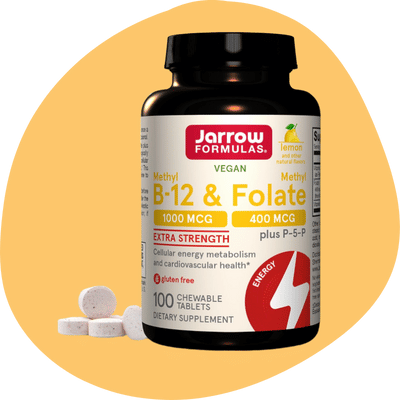
Jarrow Formulas Extra Strength Methyl B-12 combines 1000 mcg of methylcobalamin (B12), 400 mcg of methyl folate (B9), and active B6 (P-5-P) to support brain health, cellular energy, and cardiovascular function. This unique formula provides essential B vitamins in highly bioavailable forms, making it ideal for energy metabolism, red blood cell production, and nerve function. The chewable tablets are convenient and easy to absorb, and with 100 tablets per bottle, it offers a full 100-day supply. Free from gluten, soy, and dairy, this supplement is low-carb-friendly and suitable for vegetarians.

2. Iron
Iron is essential for transporting oxygen throughout the body and is vital to energy levels and immune function. Non-heme iron in plant-based foods is less easily absorbed than heme iron from animal sources. Vegetarians are at higher risk of iron deficiency, so monitoring iron intake is important.
MegaFood Blood Builder Iron Supplement
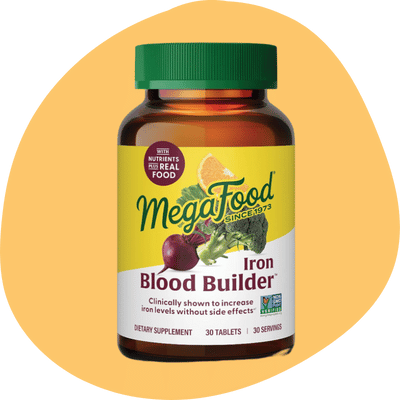
MegaFood Blood Builder is a gentle iron supplement clinically shown to increase iron levels without common side effects like nausea or constipation. Formulated with 26 mg of iron, vitamin C for enhanced absorption, vitamin B12, and folic acid, it’s designed to support healthy energy levels, immune function, and red blood cell production. Ideal for women and vegetarians, this supplement is made from whole foods, is non-GMO, vegan, and free from gluten and artificial preservatives. Each bottle contains 30 tablets, providing a convenient, effective way to support iron levels naturally.

3. Omega-3 Fatty Acids
Omega-3 fatty acids, particularly EPA and DHA, are essential for heart health, brain function, and reducing inflammation. These fatty acids are primarily found in fish, making it challenging for vegetarians to obtain adequate amounts.
OVEGA-3 Plant-Based Omega-3

OVEGA-3 provides 500 mg of plant-based omega-3s (DHA and EPA) from pure algal oil, offering a sustainable and fish-free source of essential fatty acids. Designed to support brain, eye, and heart health, these softgels provide a convenient alternative for vegetarians, vegans, or anyone looking to avoid fish-derived supplements. With two mini softgels per day, OVEGA-3 is non-GMO, gluten-free, and soy-free, making it compatible with various dietary needs and low carb lifestyles.

4. Vitamin D
Vitamin D supports bone health, immune function, and mood regulation. While sunlight exposure is a natural way to obtain vitamin D, it can be challenging to get enough, especially in colder climates or during winter months.
NatureWise Vitamin D3 5000 IU
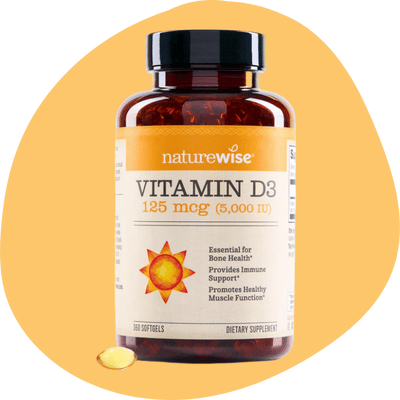
NatureWise Vitamin D3 provides a potent 5000 IU (125 mcg) dose of vitamin D3 in every mini softgel, supporting healthy muscle function, immune health, and strong bones. Each softgel is formulated with cold-pressed olive oil for enhanced absorption and is designed to provide a one-year supply with 360 softgels per bottle. This supplement is non-GMO, gluten-free, and made without artificial additives, making it suitable for a variety of dietary needs. Ideal for those with limited sun exposure, NatureWise Vitamin D3 offers an easy, effective way to maintain optimal vitamin D levels year-round.

5. Calcium
Calcium is essential for strong bones, nerve function, and muscle health. Dairy products are common sources of calcium, but low carb vegetarians who avoid or limit dairy should ensure they’re getting enough calcium from other sources.
Calcium Supplement by Ancient Nutrition
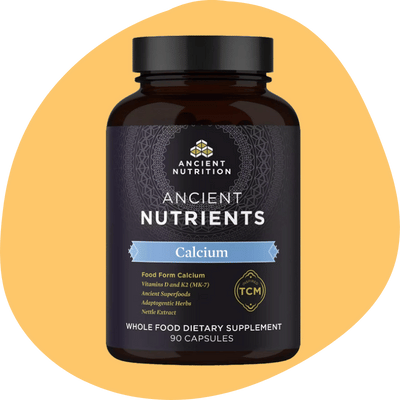
Ancient Nutrition’s Calcium Supplement combines calcium with vitamins D and K2 to promote strong bones, immune health, and muscle recovery. This formula provides bioavailable calcium alongside vitamin D for optimal calcium absorption and vitamin K2 to support proper calcium distribution to bones. Designed to fit various dietary needs, it’s paleo and keto-friendly, free from gluten, dairy, and GMOs. Each bottle contains 90 capsules, making it a convenient and comprehensive choice for those seeking enhanced bone and immune support.

6. Zinc
Zinc supports immune health, wound healing, and cell growth. Since zinc from plant-based foods is not as readily absorbed as it is from animal sources, vegetarians may have a higher risk of deficiency, particularly if they avoid nuts and seeds.
NOW Supplements, Zinc Picolinate
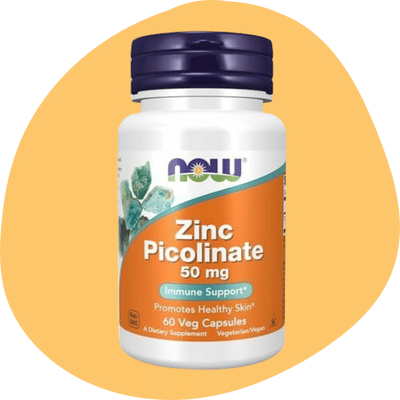
NOW Supplements Zinc Picolinate provides 50 mg of highly absorbable zinc per capsule, supporting enzyme function, immune health, and antioxidant defenses. This essential mineral aids in skin health, cellular function, and metabolic processes. Made with vegetarian capsules, this supplement is non-GMO, gluten-free, and soy-free, making it suitable for a variety of dietary needs. Each pack contains two bottles of 60 capsules, providing a 4-month supply of quality zinc to promote overall wellness and immune resilience.

7. Magnesium
Magnesium plays a role in over 300 biochemical reactions in the body, including muscle and nerve function, bone health, and blood sugar regulation. Since many magnesium-rich foods like beans and whole grains are higher in carbs, it can be challenging to obtain enough on a low carb vegetarian diet.
NOW Foods Magnesium
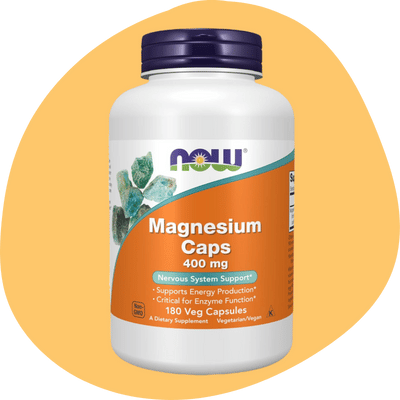
NOW Foods Magnesium 400 mg supports enzyme function, nerve health, and muscle relaxation. Each vegetarian capsule provides a potent dose of magnesium, essential for cardiovascular health, energy production, and maintaining a calm nervous system. This supplement is non-GMO, gluten-free, and free from artificial additives. With 180 veg capsules, it offers a 6-month supply, making it a convenient choice for daily wellness support and balanced magnesium levels.

8. Iodine
Iodine is essential for thyroid health and hormone regulation. Vegetarians who don’t consume dairy or eggs may have a higher risk of iodine deficiency, as plant-based iodine sources are limited.
Natural Nutra Kelp Iodine
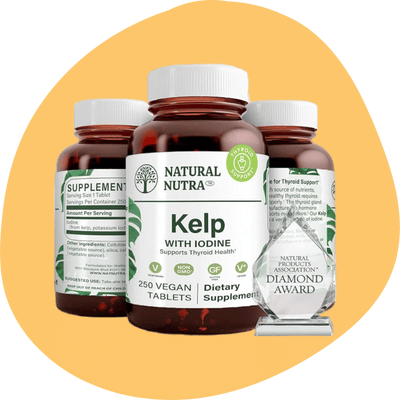
Natural Nutra Kelp Iodine provides 225 mcg of iodine per tablet, sourced from pure Atlantic sea kelp. This vegan supplement supports brain health, immune function, and healthy metabolism. Made from natural seaweed extract, it’s an eco-friendly option free from GMOs, gluten, and artificial ingredients. With 250 tablets per bottle, it offers a long-lasting supply of essential iodine, ideal for thyroid support and overall wellness.

9. Selenium
Selenium is a trace mineral that supports thyroid function, immune health, and antioxidant activity. Vegetarians who avoid eggs and dairy may lack sufficient selenium, especially if they don’t consume foods grown in selenium-rich soil.
Now Foods Selenium

NOW Foods Selenium offers 200 mcg of selenium per capsule, supporting immune health, antioxidant defense, and thyroid function. This supplement uses highly absorbable L-selenomethionine, ensuring optimal intake for vegetarians and vegans. Non-GMO, gluten-free, and free from artificial ingredients, each bottle contains 180 vegetarian capsules, providing a six-month supply. Ideal for promoting cellular health and overall wellness, NOW Foods Selenium is a reliable addition to a balanced diet.

10. Protein Powder (Optional)
If you’re struggling to meet protein needs on a low carb vegetarian diet, plant-based protein powders can be a convenient option. Look for powders that are low in carbs and sugar-free, with a complete amino acid profile.
Orgain Organic Vegan Protein Powder
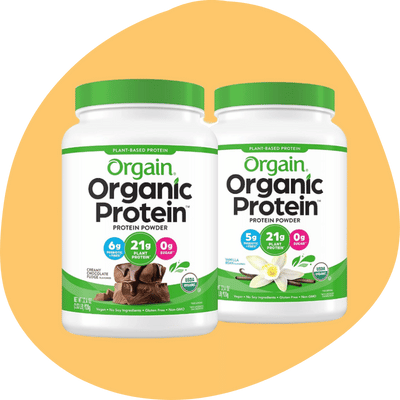
This plant-based protein powder delivers 21g of protein per serving from organic peas, brown rice, and chia seeds. Available in rich Chocolate Fudge and smooth Vanilla Bean flavors, it’s USDA organic, non-GMO, gluten-free, and soy-free, with only 150 calories and 5g of fiber per serving. Perfect for smoothies, post-workout recovery, or meal replacement, Orgain’s protein powder is low in net carbs and has no added sugar—ideal for supporting energy, muscle health, and weight management.

Tips for Using Supplements Effectively
- Consult a Healthcare Provider: Before starting any new supplements, it’s wise to consult a healthcare provider or dietitian to ensure you’re taking the right dosage for your needs.
- Take Fat-Soluble Vitamins with Food: Vitamins A, D, E, and K are best absorbed with fat, so take these with meals that contain healthy fats like avocado or nuts.
- Space Out Dosages: Some supplements, like calcium and iron, can interfere with each other’s absorption. Taking them at different times of the day can help improve efficacy.
Exercise Recommendations for a Low Carb Vegetarian Lifestyle
Exercise can amplify the benefits of your diet:
- Strength Training: Increases muscle mass, essential for vegetarians on low carbs.
- Yoga and Meditation: Helpful for stress management and balance.
Troubleshooting and Adjustments
If you’re facing challenges:
- Low Energy? Increase healthy fats for more calories.
- Feeling Hungry? Ensure your meals have sufficient protein.
FAQs: Answering Common Questions
Can You Lose Weight on a Low Carb Vegetarian Diet?
Yes, many experience weight loss by reducing carbs while maintaining a vegetarian diet.
How Much Protein Do I Need on This Diet?
Protein needs vary but aim for around 15–20% of daily calories from protein sources.
Is it Hard to Stay Low Carb as a Vegetarian?
It can be, but with the right foods, you can maintain a balanced diet.
What Are the Best Snacks for a Low Carb Vegetarian?
Nuts, seeds, Greek yogurt, and low-carb veggies are excellent choices.
The Bottom Line
A low carb vegetarian meal plan offers flexibility, health benefits, and opportunities for creative meal prep. By understanding the key nutrients and sticking to whole, plant-based foods, you can create a sustainable, satisfying lifestyle that suits your goals.




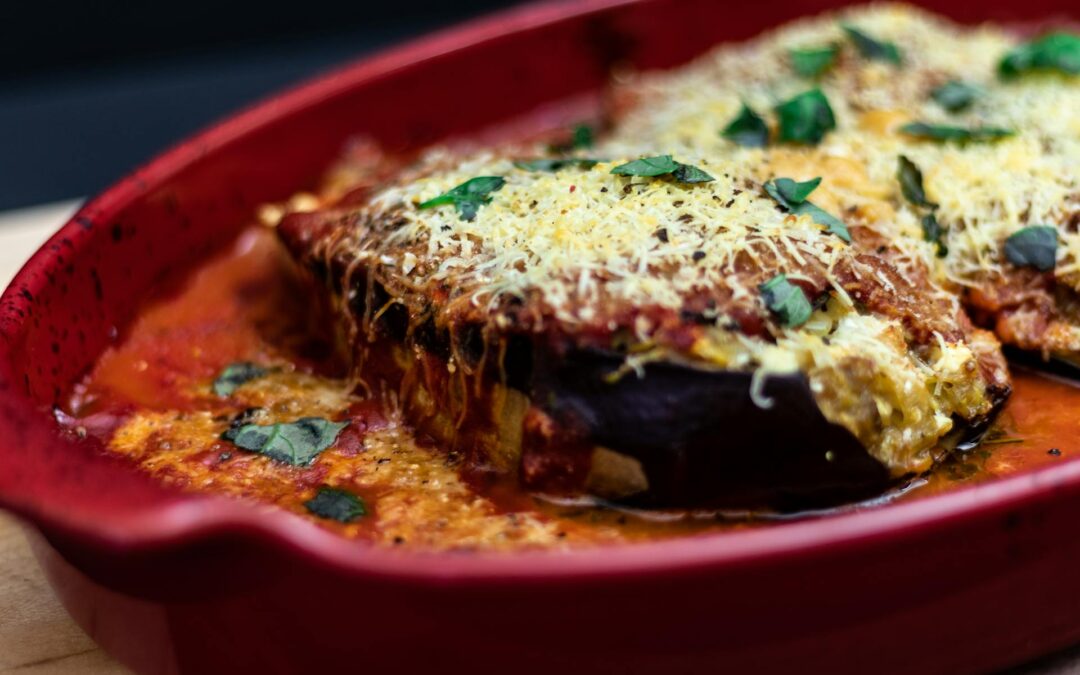
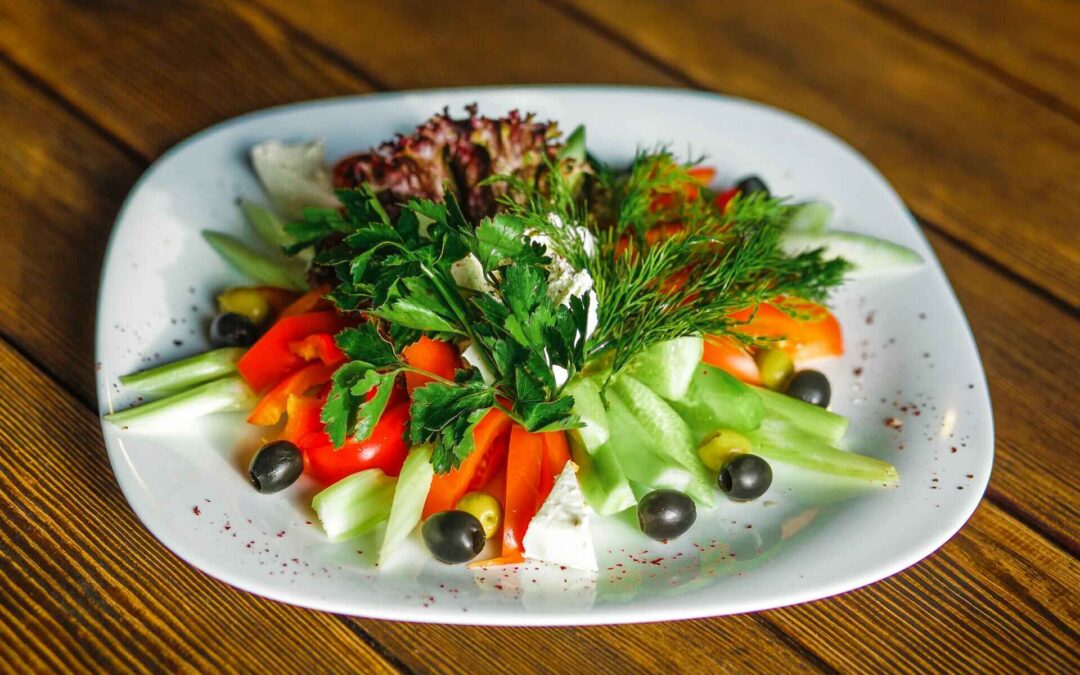
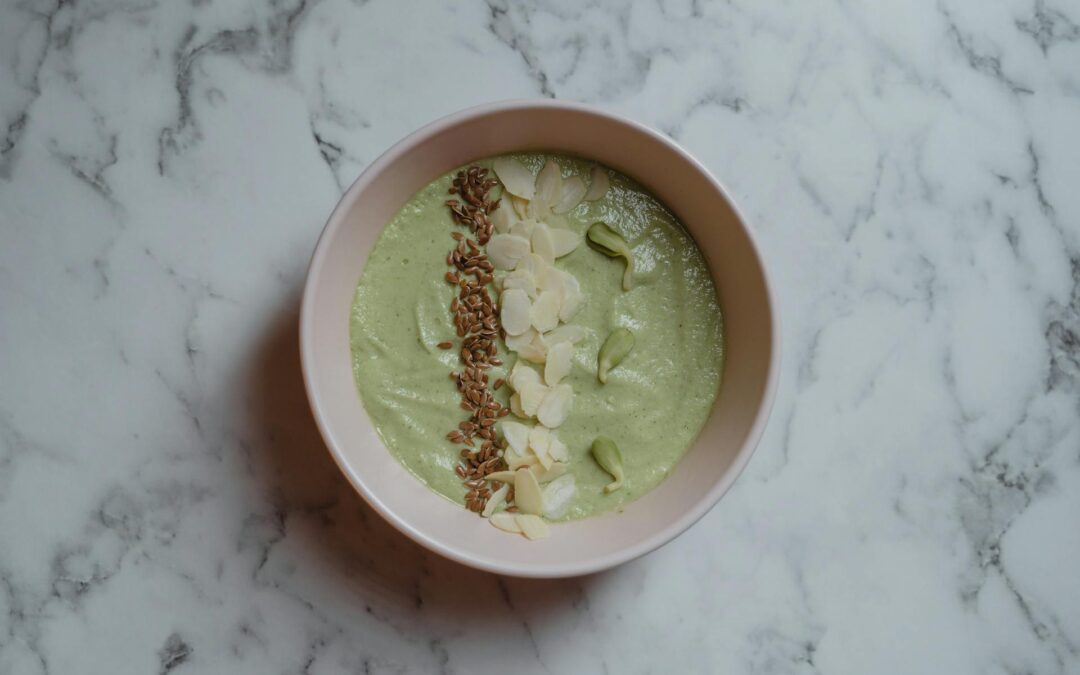
0 Comments